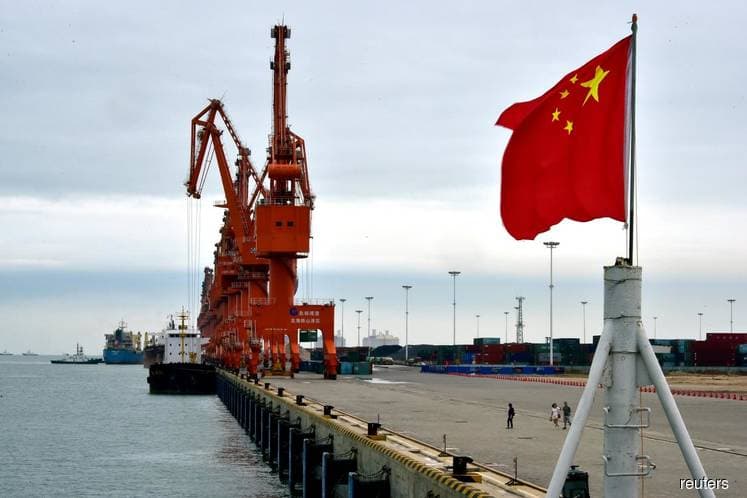
This article first appeared in The Edge Malaysia Weekly on January 15, 2018 - January 21, 2018
THURSDAY will be an interesting day for data releases in Asia, with China expected to announce its economic growth for 2017 and monetary policy decisions — the first of the year — coming from two Asian central banks, Bank of Korea and Bank of Indonesia.
Chinese Premier Li Kequang said last Wednesday that the world’s second largest economy was likely to have grown around 6.9% last year, accelerating from a 26-year low in 2016.
Analysts expect the economy to have grown around 6.8%, above the government’s target of about 6.5% and slightly better than the 6.7% growth in 2016. China’s economic expansion is closely watched, not least because it is a major trading partner for most Asian countries, including Malaysia.
Li said China performed well last year because it refrained from “flooding” the economy with stimulus like in the past while pushing ahead with reforms and cultivating new sources of momentum, the Xinhua news agency reported.
Its 3Q2017 gross domestic product (GDP) grew 6.8% year on year.
Apart from GDP data, China is also expected on Thursday to release property prices, retail sales and industrial production data for last month.
Meanwhile, the central banks of South Korea and Indonesia are expected to keep policy rates unchanged this month.
At home, on Thursday, the Department of Statistics is expected to announce the unemployment rate for November. Economists see it staying at 3.4%, the same as in the previous month.
The next day, it will release information on the inflation rate for December. Economists see the Consumer Price Index (CPI) rising by 3.2%. In November, CPI grew 3.4%.
All eyes will also be on the ringgit after its strong performance against the US dollar last week, supported by better-than-expected manufacturing data and strong crude oil prices amid a softer dollar. The ringgit ended last Friday at 3.97, up 0.6% for the week.
AmBank Research expects the US dollar to remain soft this week. In a report last Friday, it said it sees the ringgit fluctuating in the range of 3.9527 to 3.9963 against the greenback this week.
Over in Singapore, attention is expected to be focused on newsflow relating to the upcoming FY2018 Budget, which will be delivered on Feb 19.
It will be a holiday-shortened week in the US as it celebrates Martin Luther King Day on Monday.
According to UOB Global Economics and Markets Research, the focus there is likely to be on housing-related data such as the January National Association of Home Builders Housing Market Index on Jan 17 and December housing starts and building permits on Jan 18.
“That said, the focus in the US is likely to shift away from the economic data docket to the US earnings season, which will continue to see major US financial institutions reporting throughout the week,” it said in a report last Friday.
The Bank of Canada is the first among G7 central banks to have its first monetary policy decision of 2018 on Wednesday. A policy rate hike of 25 basis points is expected.
Bitcoin and other virtual currencies will also be in focus after global prices temporarily plummeted last Thursday on fears that South Korea was preparing to ban cryptocurrency trading. The country is a major source of global demand for cryptocurrency.
“There are great concerns regarding virtual currencies, and the Justice Ministry is basically preparing a bill to ban cryptocurrency trading through exchanges,” Justice Minister Park Sang-ki said in a statement last Thursday, according to Reuters.
The statement was later played down by the Presidential Office, which said a ban was under review but no policy changes had been made.
Bitcoin rebounded last Friday to hit US$14,000 on the Luxembourg-based Bitstamp exchange, after touching US$12,800 on the previous day.
On Jan 17, Swiss National Bank (SNB) chairman Thomas Jordan is expected to speak in Zurich. He will be watched for comments relating to the Swiss franc. SNB introduced negative interest rates three years ago to ward off investments in the Swiss franc, which the central bank then described as “significantly overvalued” but in December, called “highly valued” despite the currency falling 7% in value over six months.
SNB last month said it was in “no rush at all” to start normalising policy, although the US has begun to raise interest rates. Economists expect SNB to only begin raising rates when the European Central Bank increases rates and the euro-Swiss franc exchange rate is above 1.20 again.
At home, among the companies that will hold annual general meetings this week are Kinsteel Bhd (Jan 15), Poh Kong Holdings Bhd (Jan 17) and Astino Bhd (Jan 19).
Those holding extraordinary general meetings are Comintel Corp Bhd (Jan 15), Pavilion REIT (Jan 16), Asia Knight Bhd (Jan 17) and Advancecon Holdings Bhd (Jan 18).
Save by subscribing to us for your print and/or digital copy.
P/S: The Edge is also available on Apple's AppStore and Androids' Google Play.